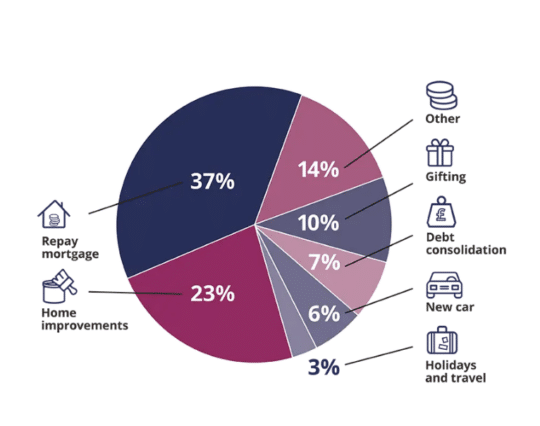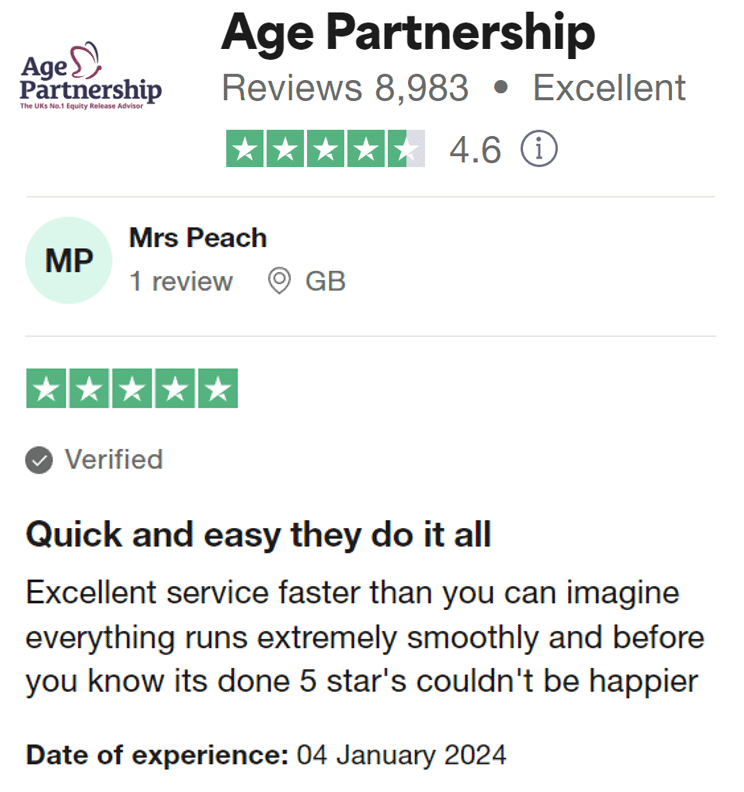Equity Release Calculator – Work Out How Much
Our preferred equity release adviser is Age Partnership. For free and impartial money advice you can visit MoneyHelper.

Our preferred equity release adviser is Age Partnership. For free and impartial money advice you can visit MoneyHelper.
Are you keen to uncover more about equity release plans and their costs? This is the perfect place for you. Our website is trusted by over 7,000 people every month seeking guidance on equity release. In this article, we’ll take you through:
- A clear definition of equity release.
- The process for obtaining a realistic quote.
- How to compute equity release costs with a calculator.
- The benefits and possible risks of equity release plans.
- Your eligibility for equity release.
We understand that you might be worried about the potential risk to your home’s equity or the long-term costs of a lifetime mortgage, which is why we’ve gathered all the necessary information to put your mind at ease.
Trust us to guide you through the process of equity release, helping you make informed decisions about your financial future. Let’s dive in.
How does equity release work?
Equity release works differently depending on what type of equity release plan you choose. We’ve explained each of the three ways to release equity in the UK below.
Lifetime mortgage
Lifetime mortgages are the most used type of equity release plan. They allow you to take out some of the value of your property as a cash lump sum or drawdown facility. This amount is charged at a fixed interest rate for the duration of the lifetime mortgage, i.e. until the property is sold.
Similar to many home equity release plans, you do not pay back the loan through monthly repayments as per other credit, and you don’t have to make monthly interest payments either. The interest is added to the total debt each month so the total owed keeps growing. However, you can make voluntary interest payments with most lenders.
The total owed will be deducted from the future sale of the property and given to the lender, and anything remaining will either be the homeowner’s if they moved into care, or estate beneficiaries if the homeowner had passed away.
If the total owed is greater than the sale proceeds of the property, then this additional money is not owed if your lender is a member of the Equity Release Council. As members, they commit to a negative equity guarantee that prevents any debt from being greater than the sale value of your property.
Enhanced lifetime mortgage
An enhanced lifetime mortgage is the same as a lifetime mortgage but is a better option if you have a reduced life expectancy or terminal illness. The enhanced lifetime mortgage may allow you to access more of the value of your home as a cash lump sum.
The amount you can borrow is increased because a reduced life expectancy means there is less chance of your home decreasing in value during the lifetime mortgage – and less risk for the lender. As part of the application, you will be required to submit a health and lifestyle questionnaire and may be asked to provide copies of medical records as proof.
Home reversion scheme
Home reversion schemes are not as common as lifetime mortgages, but some people still prefer to use them. They allow you to access some of your property value as a lump sum or drawdown facility and do not charge any interest on the amount you release. Instead, they ask for a greater percentage of the property’s future sale proceeds than the amount you are given.
For example, you may release 10% equity from your home but have to give the lender 50% of the future sale proceeds. Releasing equity this way provides more certainty of what will be owed from the eventual property sale, but it can be more costly for many.
» TAKE ACTION NOW: Find out how much equity you could release
Equity release eligibility criteria
The equity release schemes mentioned above are only available to senior homeowners, typically at least 55 to 65 years old. If you are a joint homeowner, it is the age of the youngest of the pair which must meet the minimum age requirement. Don’t confuse equity release schemes with home equity loans and second charge mortgages to release equity, which are available to people 18+.
As well as meeting the age requirement, the property you wish to release equity from must be your main residence and it must meet a minimum value, usually around £75,000. Lastly, in most cases, the property must be owned outright with no outstanding mortgage balance to pay.
How equity release could help
More than 2 million people have used Age Partnership to release equity since 2004.
How your money is up to you, but here’s what their customers do…
Find out how much equity you could release by clicking the button below.
In partnership with Age Partnership.
How much equity can I release?
In general, the absolute maximum amount of equity you can release from your home with a lifetime mortgage is around 60% with most lenders, and usually, you can only do it once per residential property.
They are not willing to let you release more than this because they want to make a profit on the mortgage and need to safeguard against property price decreases. ERC members are also aware that they cannot recover debts beyond the property value at the point of sale.
But the amount of equity you can release will also depend on the type of scheme you use. For example, an enhanced lifetime mortgage may allow you to release more than a regular lifetime mortgage or home reversion scheme. The amount you can release will also be based on your age, property value and other details about your property.
How much will I pay back with equity release?
The amount you pay back on equity release will depend on the amount of equity you release, the interest rate you agree to, and the length of time your lifetime mortgage lasts. But to give you an idea of how costly a lifetime mortgage can become, here is an example:
Let’s imagine you decide to release £65,000 from your £150,000 property to fund a number of expensive cruises over a long retirement period. As part of your lifetime mortgage, you agreed to a rolling fixed interest of 6.4% and decided to make zero voluntary interest payments. After 12 years, you need to go into long-term aged care and must sell the property as part of the agreement.
Your property increased in value by 10% over the 12 years and it was sold for £165,000. The total debt owed on your initial £65,000 equity release equates to almost £137,000 due to the rolling interest; it has more than doubled over just 12 years. So, £137,000 of the sale proceeds will be paid to the lender and the remaining £28,000 (minus fees and taxes) will be yours to keep.
The good news is that you’ll never pay back more than what your property sells for, and no outstanding debt will be taken from the remaining value of your estate or paid by beneficiaries.
Join thousands of others who release equity
Age Partnership have helped over 2 million people release equity from their home.

Mrs Wareham
“I am more than pleased to have taken out Equity Release with Age Partnership.”
Reviews shown are for Age Partnership. Search powered by Age Partnership.
What interest rate can you get on equity release?
The interest rates offered on a lifetime mortgage can differ between lenders and based on your property value. Most interest rates are offered between 4-8% at the time of writing, but these are subject to change. It’s best to do your own research to find out what the current interest rates are on a lifetime mortgage. You can ask these questions when you receive financial advice.
How do you calculate equity release?
Calculating how much you will owe on a home reversion scheme is straightforward because there is usually no interest added to the debt. But working out how much a lifetime mortgage will cost you can be difficult because the interest rolls up, and you never know how long you will have the lifetime mortgage.
Nevertheless, an equity release calculator can help…
What is an equity release calculator?
An equity release calculator is an online tool to help you work out the projected costs of a lifetime mortgage over different periods of time. You enter personal data and the calculator will tell you how much your debt will grow based on the information entered.
Where can I find an equity release calculator?
You can find a free equity release calculator on the websites of equity release providers and generic finance websites.
How does it work?
An equity release calculator usually starts by asking for personal information that may affect the interest rate offered, such as your age and details about the property. It is at this point that the calculator may tell you that you’re not eligible for an equity release plan right now, possibly because the age of the youngest applicant does not meet the minimum age requirement.
The calculator will then ask for how much equity you want to release and use a standard interest rate based on the information given to project your total debt after so many years. You could change the number of years to watch how your debt grows over time. Some sophisticated equity release calculators may allow you to input voluntary interest repayments to show how you could reduce your total debt.
Are equity release calculators accurate?
An equity release calculator is not entirely accurate because the interest rate used may not be the exact interest rate offered, but they do tend to be more accurate than other loan calculators. Another reason they are not entirely accurate is due to the unreliability of your property value estimation. Your property value is probably not what you think it is unless you recently bought the property.
As part of taking out a lifetime mortgage, there is a high chance that your property will need to be revalued.
What are the advantages of equity release schemes?
Some of the main advantages of using equity release are:
- You can receive a lump sum or drawdown facility
- The money is not subject to tax
- It can be spent on anything you want
- You continue living in your home without paying rent
- It can sometimes be used to reduce inheritance tax
What is the downside to equity release?
The major downside to equity release is the cost of it. Releasing equity with these schemes can be exceptionally expensive if you hold a lifetime mortgage for a decade or longer, like our earlier example highlights.
Another downside to an equity release scheme is that the money you receive could make you lose entitlement to means-tested benefits. You will not lose access to your state pension, but by having significant money in the bank, you could have your pension credits reduced or taken away. This then has an impact on your entitlement to other means-tested benefits, such as a council tax reduction.
Learn more about equity release here!
Uncover more about equity release schemes in the UK with MoneyNerd. Our team has just published 100+ new equity release guides and discussion posts to help all seniors considering this option. Read them for free on our website and get answers to the most asked equity release questions.


